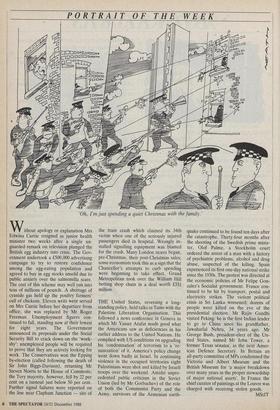PORTRAIT OF THE WEEK
'Oh, I'm just spending a quiet Christmas with the family.'
Without apology or explanation Mrs Edwina Currie resigned as junior health minister two weeks after a single un- guarded remark on television plunged the British egg industry into crisis. The Gov- ernment undertook a 000,000 advertising campaign to try to restore confidence among the egg-eating population and agreed to buy in egg stocks unsold due to public anxiety over the salmonella scare. The cost of this scheme may well run into tens of millions of pounds. A shortage of cyanide gas held up the poultry farmers' cull of chickens. Eleven writs were served on Mrs Currie before her departure from office; she was replaced by Mr Roger Freeman. Unemployment figures con- tinued to fall, standing now at their lowest for eight years. The Government announced its proposals under the Social Security Bill to crack down on the 'work- shy': unemployed people will be required to prove that they are actively looking for work. The Conservatives won the Epping by-election (called following the death of Sir John Biggs-Davison), returning Mr Steven Norris to the House of Commons; the Tory majority, however, fell by 22 per cent on a turnout just below 50 per cent. Further signal failures were reported on the line near Clapham Junction — site of the train crash which claimed its 34th victim when one of the seriously injured passengers died in hospital. Wrongly in- stalled signalling equipment was blamed for the crash. Many London stores began, pre-Christmas, their post-Christmas sales; some economists took this as a sign that the Chancellor's attempts to curb spending were beginning to take effect. Grand Metropolitan took over the William Hill betting shop chain in a deal worth £331 million.
THE United States, reversing a long- standing policy, held talks in Tunis with the Palestine Liberation Organisation. This followed a news conference in Geneva in which Mr Yasser Arafat made good what the Americans saw as deficiencies in his earlier address to the United Nations. He complied with US conditions on upgrading his `condemnation' of terrorism to a 're- nunciation' of it. America's policy change went down badly in Israel. In continuing violence in the occupied territories eight Palestinians were shot and killed by Israeli troops over the weekend. Amidst unpre- cedented public criticism in the Soviet Union (led by Mr Gorbachev) of the role of both the Communist Party and the Army, survivors of the Armenian earth- quake continued to be found ten days after the catastrophe. Thirty-four months after the shooting of the Swedish prime minis- ter, Olof Palme, a Stockholm court ordered the arrest of a man with a history of psychiatric problems, alcohol and drug abuse, suspected of the killing. Spain experienced its first one-day national strike since the 1930s. The protest was directed at the economic policies of Mr Felipe Gon- zalez's Socialist government. France con- tinued to be hit by transport, postal and electricity strikes. The violent political crisis in Sri Lanka worsened: dozens of people were killed on the eve of the presidential election. Mr Rajiv Gandhi visited Peking: he is the first Indian leader to go to China since his grandfather, Jawaharlal Nehru, 34 years ago. Mr George Bush, president-elect of the Un- ited States, named Mr John Tower, a former Texas senator, as the next Amer- ican Defence Secretary. In Britain an all-party committee of MPs condemned the Victoria and Albert Museum and the British Museum for `a major breakdown over many years in the proper stewardship of major national assets'. In France the chief curator of paintings at the Louvre was charged with receiving stolen goods.
MStJT










































































































 Previous page
Previous page